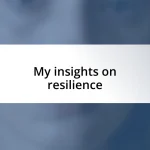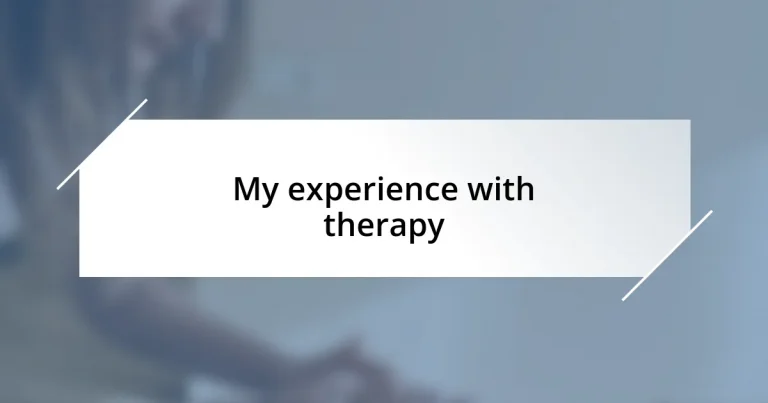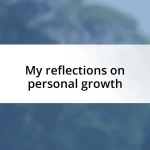Key takeaways:
- Emotional vulnerability in therapy can lead to personal empowerment and self-discovery.
- Techniques like cognitive behavioral therapy and mindfulness practices helped in managing stress and enhancing emotional regulation.
- Establishing a trusting relationship with the therapist is crucial for effective therapy outcomes.
- Confronting discomfort and exploring deep-seated emotions can reveal profound insights and stimulate personal growth.
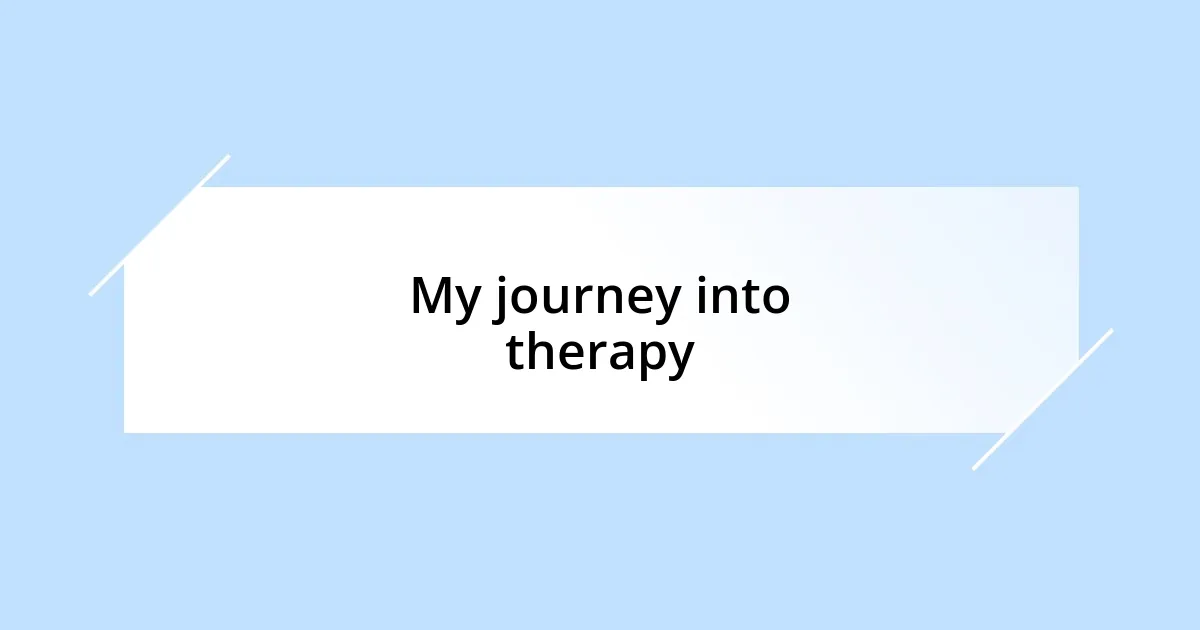
My journey into therapy
I still remember the moment I decided to step into therapy. It felt like standing on the edge of a diving board, staring down into uncharted waters. I wondered, “What would I find if I jumped?” Despite my fears, I knew I had to take the leap for my mental health.
My first session was a whirlwind of emotions. I can’t recall a time when I felt so vulnerable yet, oddly, safe at the same time. As I shared my struggles, I found myself questioning everything—why I felt the way I did and how I had gotten there. It was a sobering experience that made me reflect deeply on my journey thus far.
After a few sessions, I began to uncover layers of my past that I didn’t even know existed. Each revelation brought a rush of vulnerability, but also an exhilarating sense of freedom. I remember saying to myself, “Is this what it feels like to truly be seen?” Therapy opened doors I never realized were closed, and I felt a sense of empowerment that I had been longing for.
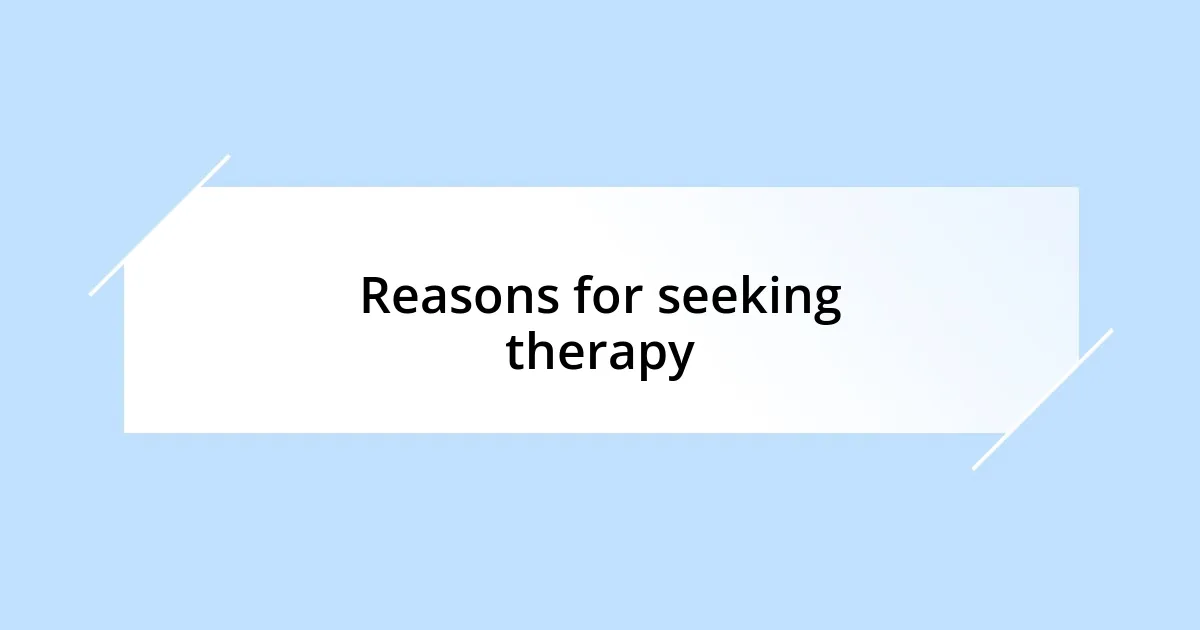
Reasons for seeking therapy
Seeking therapy often stems from a range of personal struggles. For instance, I found myself drowning in stress due to work pressures and personal expectations. The anxiety was overwhelming, and I realized that I needed an objective perspective to help navigate through it. The thought of talking to someone felt daunting at first, yet I knew it was a step toward reclaiming my peace of mind.
Many people, like myself, find therapy beneficial during life transitions. I remember moving to a new city; it was exciting yet isolating. I felt lost and needed guidance to adapt to my changing environment. Therapy provided me with valuable tools to build resilience and explore new connections, helping me to feel more at home in this unfamiliar place.
Some individuals pursue therapy out of curiosity about their mental health. I personally approached it with a sense of exploration. Each session felt like peeling back the layers of an onion, revealing insights about myself that I had never considered. The self-discovery I experienced turned out to be one of the most rewarding aspects of my journey.
| Reason | Personal Experience |
|---|---|
| Stress Management | Dealing with overwhelming work anxiety. |
| Life Transitions | Adjusting to moving to a new city. |
| Self-Discovery | Exploring insights about my mental health. |
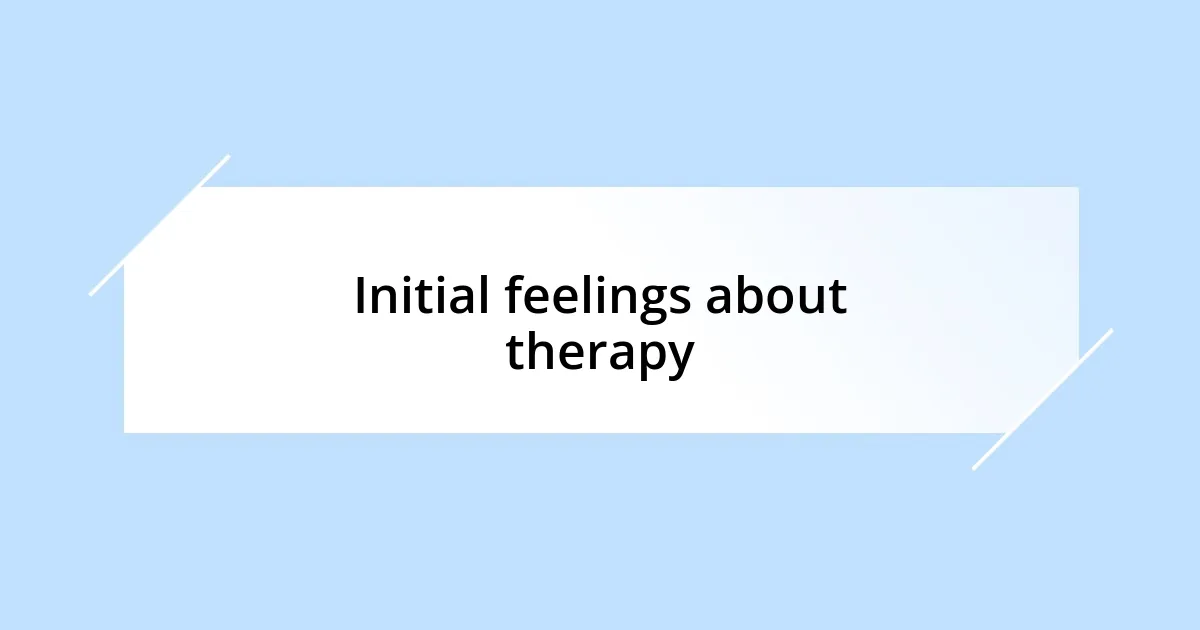
Initial feelings about therapy
Stepping into therapy for the first time brought a storm of emotions. I was excited yet terrified, much like the feeling of standing at the base of a mountain, ready to climb but uncertain of what awaited me at the summit. I felt a mix of hope and apprehension: Would I be able to voice my thoughts? Would the therapist understand my struggles? Each question swirled in my mind, reminding me that vulnerability was the only way to truly embark on this journey.
- The fear of judgment loomed large; I worried about what my therapist might think as I unraveled my story.
- Yet, there was a flicker of optimism—a glimmer that maybe this would lead me to understanding myself better.
- I felt like a book with many untold chapters, and I was finally ready to start reading.
As I settled into my first few sessions, I found the initial tension gradually melting away. There’s something about the therapist’s calm presence that reassured me; it felt like opening the door to a safe space, a sanctuary where I could unpack my emotional baggage. I vividly recall letting out a breath I didn’t even realize I was holding, as I shared my story for the first time. That release was profound, as the knot in my chest began to loosen, making room for healing and self-acceptance.
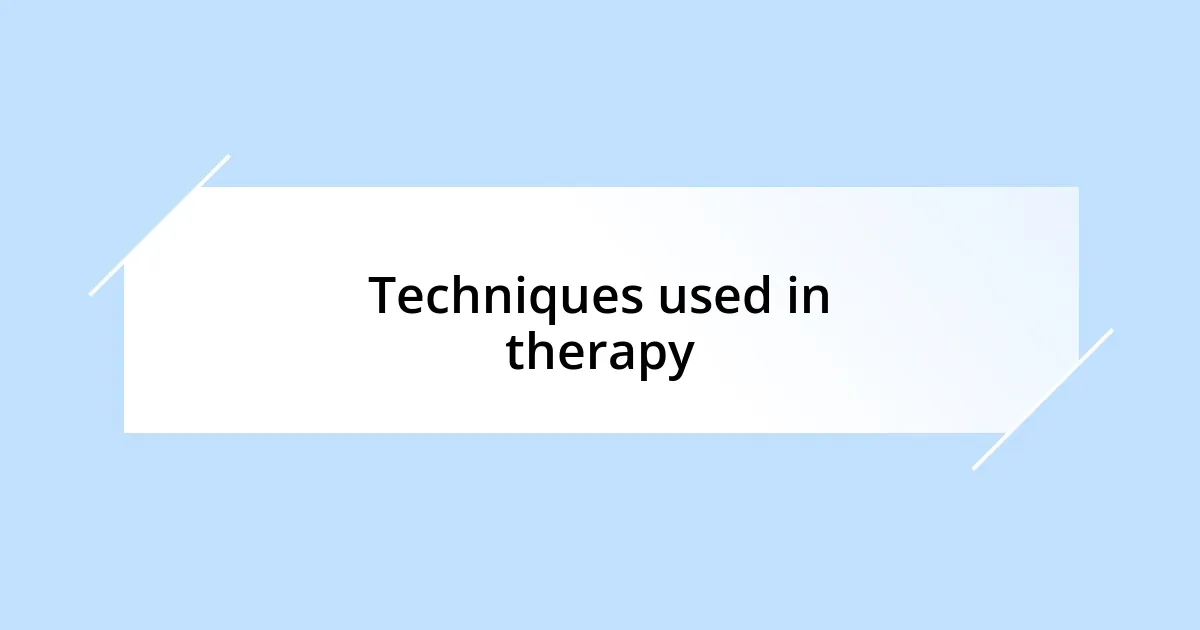
Techniques used in therapy
One technique that stood out to me in therapy was cognitive behavioral therapy (CBT). It felt like a light bulb went off when my therapist introduced it. By identifying negative thought patterns and challenging them, I learned to reframe situations that once overwhelmed me. It was empowering to realize that not every thought I had was factual, and I could control how I responded to stressors.
Mindfulness exercises also played a significant role in my sessions. I recall struggling to stay present; my mind would race with worries about the future or regrets from the past. Through guided mindfulness practices, I found a sense of calm. Engaging in techniques like deep breathing allowed me to ground myself, creating a sanctuary in my mind when external chaos swirled around me.
Another key component was the use of journaling. Often, I’d leave therapy feeling a bit raw, and my therapist would encourage me to write down my thoughts afterward. This practice became a release for me, like a friend who listened without judgment. It helped me process my emotions more deeply, transforming vague feelings into tangible insights. Have you ever tried expressing your feelings on paper? I can say from experience, it can be a revelation.
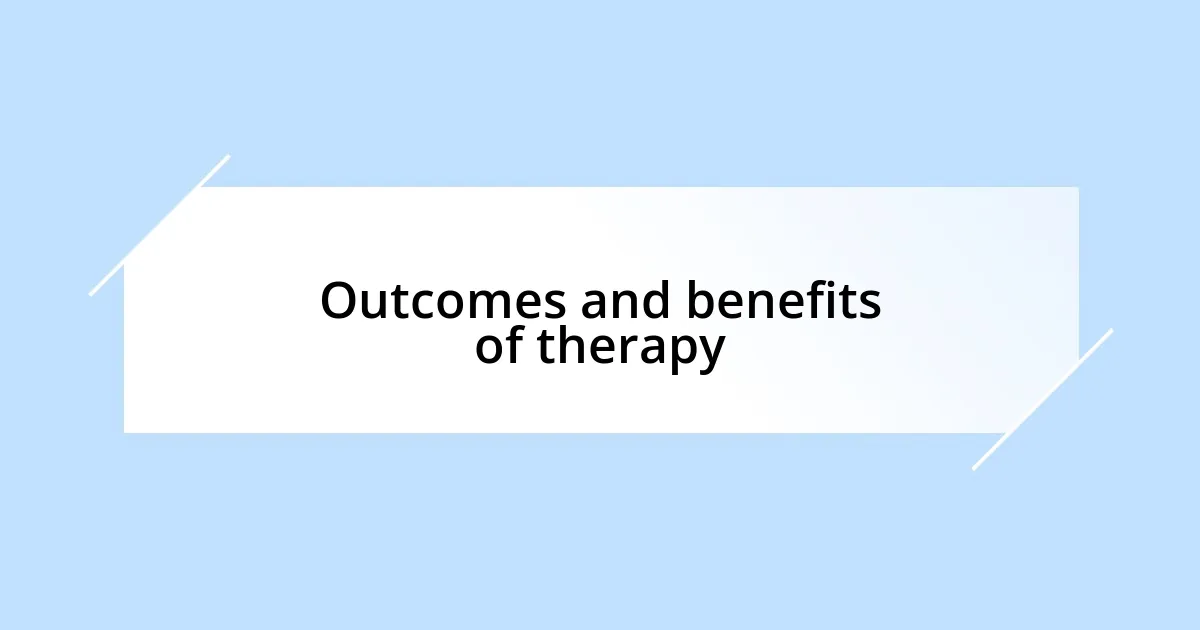
Outcomes and benefits of therapy
The outcomes and benefits of therapy can truly be transformative. Looking back on my journey, I realized that one of the most significant changes was in my self-awareness. I began to notice patterns in my behavior and thoughts that I had previously overlooked—simple moments when I would react in anger or withdraw due to anxiety. Recognizing these patterns empowered me to make intentional adjustments in my daily life. Have you ever caught yourself reacting and wondered why? Therapy equipped me with the tools to explore those “whys” and ultimately respond in healthier ways.
Another remarkable benefit I experienced was enhanced emotional regulation. Early on, I often felt like a rollercoaster, with my emotions swinging wildly. Through therapy, I learned to name my feelings, which was liberating. The act of simply acknowledging what I felt—be it sadness, anger, or joy—offered me a clearer perspective. I remember a particularly heavy week at work that left me drained. Instead of succumbing to burnout, I utilized the mindfulness techniques from therapy and took time to check in with myself. This small act allowed me to recharge rather than spiral down into overwhelm.
Perhaps what stands out the most for me is the sense of connection I gained—not just with my therapist but also with myself and the world around me. Therapy fostered a deeper understanding of my needs, giving me the confidence to express them to others. I found myself engaging in relationships with a newfound authenticity. It’s fascinating how letting go of the fear of judgment enabled me to share my vulnerabilities with friends, enriching those bonds. Have you ever felt that kind of lightness that comes from simply being yourself? To me, that’s one of therapy’s greatest gifts.
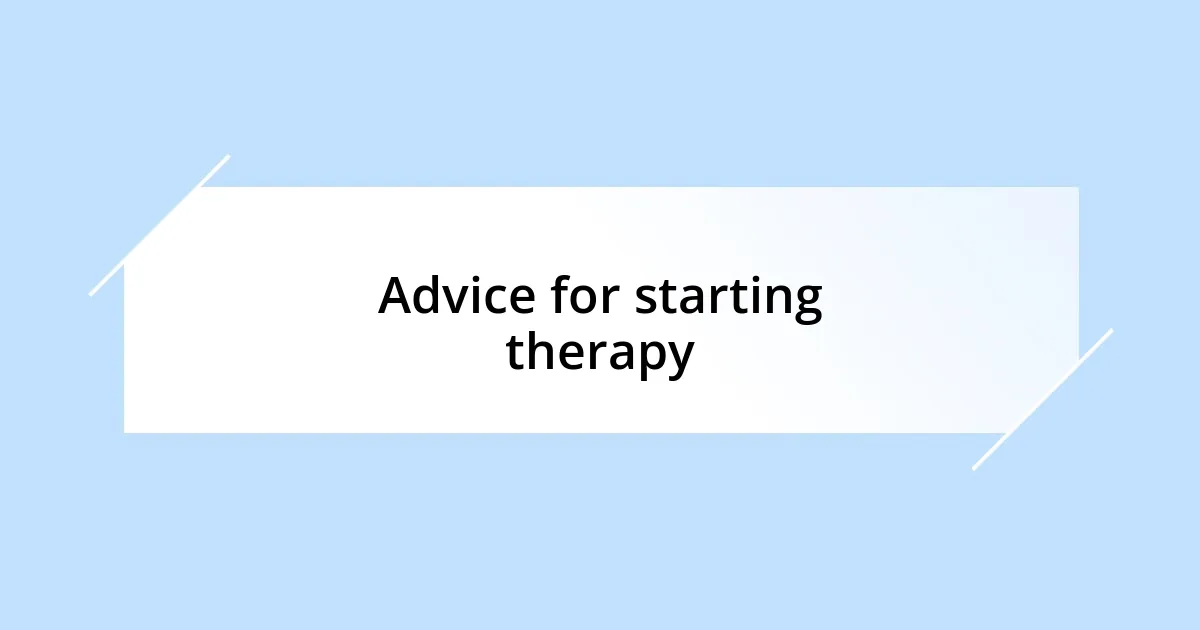
Advice for starting therapy
Starting therapy can be a bit daunting, but my advice is straightforward: trust your instincts. When I began, I spent time researching therapists to find someone who resonated with me. I remember feeling a mix of excitement and anxiety during that search. Have you ever felt that sense of uncertainty when trying something new? Just know that it’s completely normal. Finding the right fit can make all the difference in your therapeutic journey.
Another piece of advice I’d suggest is to be open about your expectations. One of my early sessions revolved around what I hoped to gain from therapy. I thought it would be all about fixing my struggles, but it often turned into exploring my fears and aspirations too. Sharing your goals can help build a roadmap for your sessions. What do you genuinely want to achieve? By articulating your thoughts, you and your therapist can work collaboratively toward your personal growth.
Lastly, give yourself permission to feel uncomfortable. I’ll be honest; there were moments in therapy when I had to confront feelings I’d buried for years. It felt like opening a floodgate. I asked myself a lot of questions during those times, like, “Why is this so hard?” Perhaps it’s because unearthing emotions can be painful yet liberating. Embracing the discomfort can lead to profound insights about yourself, helping you navigate through those emotions in a healthier way.
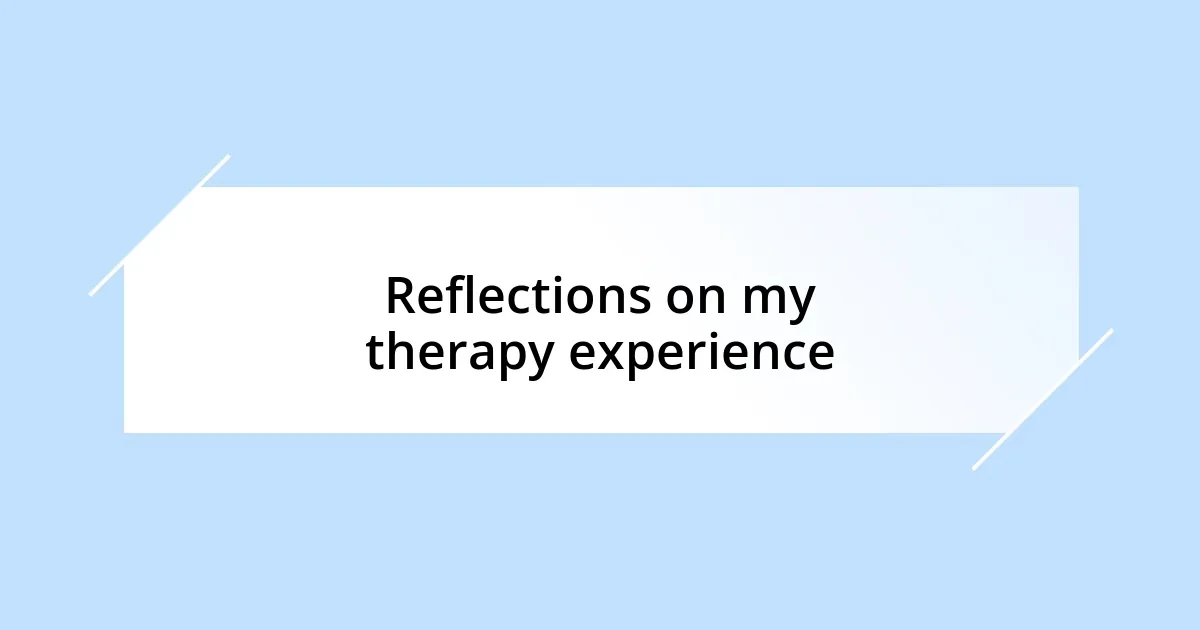
Reflections on my therapy experience
Reflecting on my therapy experience, I often think about the moments when clarity struck me like a bolt of lightning. I vividly recall a session where I described a recurring dream that had haunted me for years. As I unraveled its layers, the realization hit me hard: my subconscious was trying to tell me something important about my fears of inadequacy. Have you had those moments when everything just clicks? It’s truly a transformative feeling.
There was a period during therapy when I wrestled with self-doubt, and it was exhausting. One day, I brought up a situation where I had avoided a friend’s invitation out of fear of social anxiety. My therapist’s gentle nudge to consider what I might miss by staying in helped me realize how often I let worry dictate my life. This was a tough pill to swallow; I had to confront the reality that my anxieties were holding me back from connections that could enrich my life. Do you ever find yourself in a similar position, hesitating to step out of your comfort zone?
What surprised me most was the profound sense of personal growth I experienced. I remember describing a big life choice—a change in my career path—feeling utterly torn. But through our discussions, I unearthed the values that truly mattered to me, which made the decision clearer. It’s fascinating how therapy can strip away the noise and allow you to hear your authentic self. Have you ever felt that sense of unfolding within you? That’s the beauty of therapy—it’s not just about solving problems; it’s about discovering who you are.











